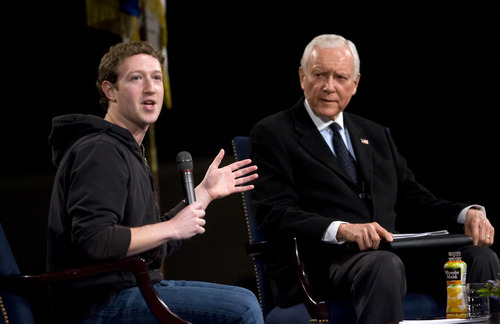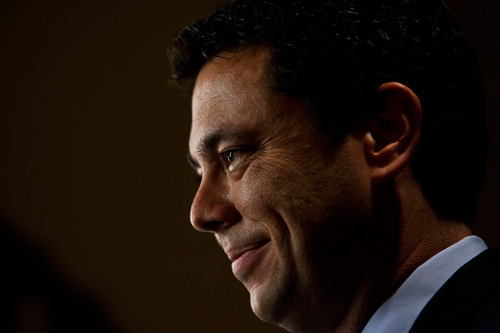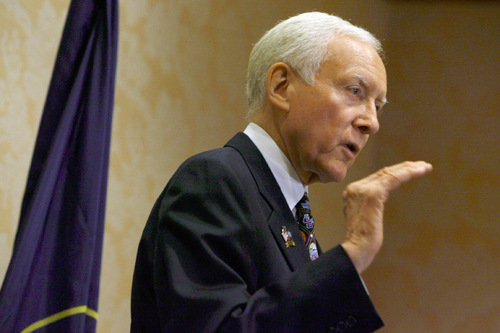This is an archived article that was published on sltrib.com in 2011, and information in the article may be outdated. It is provided only for personal research purposes and may not be reprinted.
Washington • In one of the few bipartisan efforts of the year, Congress is expected to extend three parts of the Patriot Act before they expire on Friday.
Sen. Orrin Hatch plans to support the move and vote in lockstep with the vast majority of Republicans. Yet this vote is likely to become a political liability for the senator, who is trying to head off a conservative revolt in the state he has represented since 1977.
That's because a vocal group of tea party activists see the Patriot Act as a gross invasion of personal liberty and a clear violation of the Constitution's protection against unreasonable searches. It is the same group Hatch has tried to court in recent weeks as he prepares for an expected tea party challenge in 2012.
It also doesn't help that Utah's three other Republicans in Congress — Sen. Mike Lee, Rep. Rob Bishop and Rep. Jason Chaffetz — oppose the extension.
"Hatch is already in big trouble, having a 36-year record up for scrutiny. Extending the Patriot Act will only add fuel to the fire," said Darcy Van Orden, one of the leaders of Utah's tea party movement, who called the Patriot Act a "deplorable piece of legislation."
An unusual mix of tea party Republicans on the right and civil libertarians on the left argue the Patriot Act is unconstitutionally invasive, while Hatch and a majority of Republican and Democratic leaders say the provisions are not only constitutional but vital.
"Our Constitution is explicit that the role of the federal government is to provide for our national defense," said Hatch, who spent two decades on the Senate Intelligence Committee. "And a strong national defense is precisely why I support extending these expiring provisions."
The bill, if approved as expected this week, will keep three of the Patriot provisions in place until the middle of 2015.
These sections include roving wire taps, allowing the government to track a foreign suspect who has no known ties to terrorists groups and providing broad access to business records.
"For years, leading conservatives have supported the Patriot Act as a critical tool in the fight against terrorists," Hatch said. "It has stopped additional terrorist attacks on American citizens and is needed to prevent and undo future plots."
But it has also split the tea party. About half of the House Tea Party Caucus, including its leader, Rep. Michele Bachmann, R-Minn., supported a short-term extension of those same three provisions in February. So did Sen. Jim DeMint, R-S.C., a tea party icon.
But two other prominent tea party politicians see it differently. Sens. Rand Paul, of Kentucky, and Utah's Lee were the only Republicans to vote against the provisions in February, and they plan to do so again this week. They say the government has the tools to go after terrorists without these expanded rights.
"I think you will see more than two of us vote against this reauthorization," Lee said.
He has concerns that investigators can provide scant information to get roving wire taps, and he's calling for amendments that would require law enforcement to provide more details to judges before they track suspects.
Lee is new to the issue, having joined the Senate in January. Bishop has always voted against Patriot Act extensions and he plans to this week, while Rep. Jim Matheson, D-Utah, has supported the Patriot Act since its first vote and will do so again this week.
Those who support the Patriot Act provisions should prepare to face some tea party wrath — just ask Chaffetz.
He voted against a similar extension in 2010, only to back the short-term bill this February, prompting a group of past supporters to immediately question his conservative credentials.
"I let him know that it wasn't acceptable,"said Van Orden, a co-founder of Utah Rising. "It is just not something we are going to tolerate."
Chaffetz said he won't be voting for the extension this time around, but he denies that he has changed his views on the Patriot Act or conformed to tea party pressure.
He opposed the extension in 2010, he said, because Democrats rushed the bill to the floor without holding hearings. He said he supported the extension in February because Republican leaders promised it would be only for a few months and allow for detailed confidential security briefings.
He said he has participated in those briefings and has concerns about the overbroad access to business records.
Chaffetz, who is considering a run against Hatch in 2012, said the senator will have to answer for his Patriot Act vote, though he said it has come up infrequently at town hall meetings.
"It doesn't come up very often, but those who care about it care passionately about it," Chaffetz said.
Hatch's Senate office has received calls from upset Utahns about his position, and campaign manager Dave Hansen said he expects the Patriot Act to become a campaign issue for the senator, but like Chaffetz, he thinks it will be a minor one.
"For some it becomes a defining issue, but I don't think it is many," Hansen said. "I think most people will look at the reasons that he will support it and understand those reasons."
The Patriot Act
The law was first passed in the days after the 9/11 attacks and was designed to give law enforcement enhanced powers to go after potential terrorists. The vote this week is not on the full Patriot Act, but three sections of the law that are set to expire. The bill, if approved as expected, will keep them in place until the middle of 2015.
These sections include roving wiretaps, which allow investigators to track any device used by an individual, and the so-called "lone wolf" provision, which allows the government to track a foreign suspect who has no known ties to terrorists groups. A third provision deals with broad access to business records.







